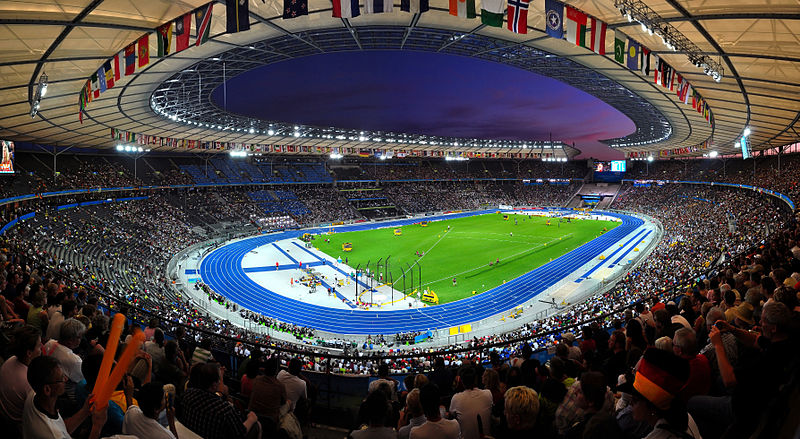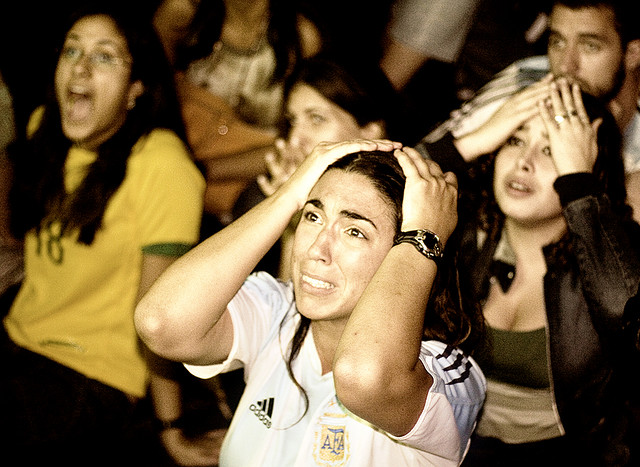5 Dramatic Events in Germany’s 2006 World Cup Stadiums
With the World Cup in Brazil just over a month away, football is on the minds of many a world traveller, and not just in South America. Germany hosted the World Cup in 2006 in 12 stadiums, or stadien, dotted around the country, and most saw their fair share of the high quality football and controversy we’ve come to expect of the sport’s top tournament.
Here’s a rundown of the main highs (and lows) from Germany’s hosting of the 2006 World Cup:
Table of Contents
Photo by Tobi 87
1. The Final: Olympiastadion, Berlin
As the scene of the final between Italy and France, it is not remembered fondly by aficionados of the sport. After a 1-1 draw, Italy won 5-3 in a penalty shoot-out, but the game will be remembered mostly for legendary French midfielder Zinedine Zidane’s remarkable head-butt of Italian Marco Matterazi – his final action in football.
2. The Hosts Bow Out: Signal Iduna Park, Dortmund
German dreams were dashed in the home of the Bundesliga’s Borussia Dortmund - with penalties looming, Italy scored twice in the final two minutes of extra time to stun the host nation in the semi-final.
3, Argentina’s Wonder-Goal: Zentralstadion, Leipzig
Now known as the Red Bull Arena, Leipzig’s stadium witnessed perhaps the goal of the tournament – an extraordinary extra-time chest-and-volley from outside the penalty area by Maxi Rodriguez, to send Argentina into the quarterfinals at the expense of Mexico.
4. England Fail on Penalties Again: Veltins-Arena, Gelsenkirchen
Since their World Cup victory of 1966, England’s World Cups have been sorry tales of missed opportunities and missed penalties. Gelsenkirchen witnessed England’s 2006 limp exit, 3-1 in a shootout to Portugal after a dull 0-0 draw.
5. The Battle of Nuremberg, Frankenstadion, Nuremberg
The smallest of the World Cup stadiums at just under 42,000 spectators is the home of Bundesliga side 1. FC Nürnberg was the scene of a second-round match in which Portugal knocked out the Netherlands. The game is known as the Battle of Nuremberg as the four red cards and 16 yellow cards handed out by the Russian referee is the most of any World Cup match, before or since.
Other stadiums and events
Matches were also played in the RheinEnergie Stadion in Cologne, the AWD-Arena in Hannover, the Gottlieb-Daimler-Stadion in Stuttgart, the Fritz Walter Stadion in Kaiserslautern, Munich’s famous Allianz Arena, the AOL Arena in Hamburg and the Commerzbank Arena in Frankfurt. The last of these saw Brazil’s exit to France in the quarterfinals – their fans will be expecting a lot better on home turf this summer.
Visitors to Germany can visit all 12 of these World Cup stadiums, either for guided tours on certain days or to watch each particular home team play in the German Bundesliga. For example, a tour of the Olympiastadion in Berlin is available all year round (except on match days) for just seven euros for a standard adult ticket.
Some of the German football terms you may need to know include die Ecke (corner), der Freistoß (free kick), der Torhüter (goalkeeper), die latte (crossbar) and Das war kein Abseits, Schiedsrichter (That was never offside, referee!)
Travelling to Germany armed with just football phrases in your vocabulary won’t get you very far, though – take a free German level test to work out your current level of German and see whether you’re likely to be given a winner’s medal or a red card from the taxi drivers and waiters of Deutschland.
If you happen to be heading to Brazil for the 2014 World Cup, try your hand at our Portuguese level test instead!




